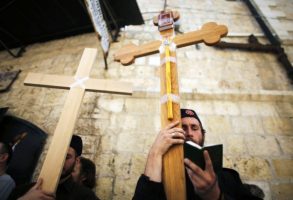The Church services of Great Lent constantly provide us with examples to follow, and examples to avoid. Lent begins with the Canon of St. Andrew of Crete, which goes through the entire Bible, listing the good and the bad, urging us to follow the good. Holy Week provides us with a short-list. The bad examples include the Pharisees and Sadducees we hear about on Holy Tuesday, and the ultimate bad example this week is, of course, Judas.

Christ in the house of Simon the Leper
At the Bridegroom Matins of Holy Wednesday we are given a pairing of good and bad figures. The bad one is Judas. Who is the good one? One might have expected one of the other disciples: Peter – the rock on which the Church is built. Or John, the beloved disciple. But it’s not Peter, or John, or any of the disciples, and that is partly because the disciples actually don’t do so well this week. They’ve been either misunderstanding or half-understanding Jesus’s message all along. Now, as Christ draws near to his Passion, they begin showing themselves as especially clueless. For the most part, they flee the scene.
It’s not that the disciples are on the Holy Week list of bad examples. What they are is guileless. Their misunderstandings are completely absent of malice. They are like children. Two Sundays ago, the gospel reading has Our Lord explaining to them again that he was about to be tried and killed. And their response is, effectively, “Er, right. Would you do whatever we ask of you?” Could this be a child-like attempt at deferring the painful information they’ve just been given? One thinks of a mother who tells her young children, “Your father is going to have a critical surgical procedure tomorrow, and in fact he may not make it.” And the children respond, “Oh, can we get ice cream at the hospital?” That’s the disciples — at this stage of the gospel story. Of course, when these same disciples see the Lord lifted up, they come to understand, better than anyone, that he was the one spoken of in the Scriptures. And they become the bedrock of the Church’s faith, its ministry, and its entire life. And this, by virtue of that same purity of heart and mind.
Still, when it comes to this week, they aren’t exemplary. And so, tonight, the one who is exemplary is the harlot who falls at Jesus’s feet. The Church’s hymnography, which always loves paradoxes and parallels and opposites, gives us several fundamental oppositions between the sinful woman, and Judas:
She rejoiced in pouring out her precious gift.
He hastened to sell the precious one.
She recognized the Master, but Judas parted from Him.
She was set free, but Judas was enslaved to the enemy.
As [she] was bringing her offering of myrrh,
the disciple was scheming with lawless men.
Out of all the traits that unite the various bad-guys we are presented with this week, I think one stands out in a very particular way, and that is calculation. Conniving, scheming, plotting. Guile. We find this in the Pharisees as well: let’s see: seven brothers, each dies – who’s wife is she? To whom to we pay taxes? What’s the greatest commandment – all of these being asked in order to slip Jesus up. Hypocrites!
Now, as I’ve said, the disciples were clueless during much of Jesus’s ministry, but they were pure. What you saw is what you got. They were transparent, they adored their Lord, and – crucially – this is what led them to be willing to understand, and to become the bedrock of the Church. “Out of the mouths of babes and infants God has fashioned perfect praise!” Judas, on the other hand, calculated. He schemed. He allowed his mind to get all twisted and convoluted (one thinks of Tolkien’s Gollum.) And, as we will sing on Thursday evening, he was unwilling to understand.
Contrast this with the harlot. To make a long story short, what she’s about, really, is the absence of calculation, the absence really of any ratiocination, in fact, but rather the total surrender of the self, in repentance, and in love. And all this in perfect simplicity, and guilelessness. And this makes for a complete surrender. She wipes Jesus’s feet, not with a towel, or her sleeve, but with her hair. She speaks with her body, and her beauty. As a harlot, this is how she was accustomed to speaking. This time, she is bringing her body to its perfect place. She brings the totality of her being to the Lord.
So I think that a lot of her lesson for us has to do with this simplicity, with this shutting off of all guile, all calculation, and really all of the internal chatter of the mind, so that we may focus on the one thing needful, and give ourselves completely to that one thing. In this, the harlot becomes the anti-Judas, and by being the anti-Judas, she in fact fulfills here what the apostles would eventually become. This is what we learn from the great hymn of Kassia the Nun, sung tonight. This hymn reveals the harlot as one who recognizes Jesus Christ’s divinity, seeing him as the one who created the world, as the one walked in Eden, and as the judge of the universe. She recognizes Jesus perfectly for who he is. This is the apostolic faith, and it is the goal of the Christian life: to come to the true knowledge of God, in his Son and Spirit, in purity and simplicity.
And of course the more we grow in that pure faith, like the harlot we also come to knowledge of our own sins. The more we perceive the height of the goodness of God, the more we are aware of the depth of our sinfulness. This dual path is testified throughout the ascetical tradition. This is the task of our life, but it is particularly our task for this week, for this evening, for right now. We are to strive for this simple, transparent, and unencumbered disposition. That is why we fast: we purify. That is why we confess our sins before or during Holy Week: we clean the slate. That is why we spend hours in church: we refocus our entire being, body and soul.
We refocus, we stop calculating. Indeed, ideally, as much as possible, we stop thinking. We stop cogitating. Stop the internal dialogue. “Wait, what did she mean when she looked at me that way?” “How should I respond to that blog entry? Or that news report about that Church scandal?” Not now, brain. Hush. We drop to the ground, acknowledging just these two things: Jesus’s self-emptying love for us, and our own sinfulness and unworthiness. Indeed, when we prostrate ourselves on the ground, as we do so much during this week’s church services, we are, with our bodies, reproducing the posture of the sinful woman who falls at Jesus’s feet.
While we’re on the ground, let’s make this into a training for the soul. And this is what our bodies should be telling our souls: Shh. Shhh. Stop the chatter. You are at the feet of your Lord, who is your judge, who loves you more than anyone can, and forgives you. You are at the feet of the one who submits himself to this insane world, unto death, so that he might make the world sane again.
So this week, this day, this hour, let’s cut the mental chatter. …simplify. …focus. and get ready to fall at the feet of our Lord.
Please also see
Sermon for Great Wednesday by Igumen Savva



















